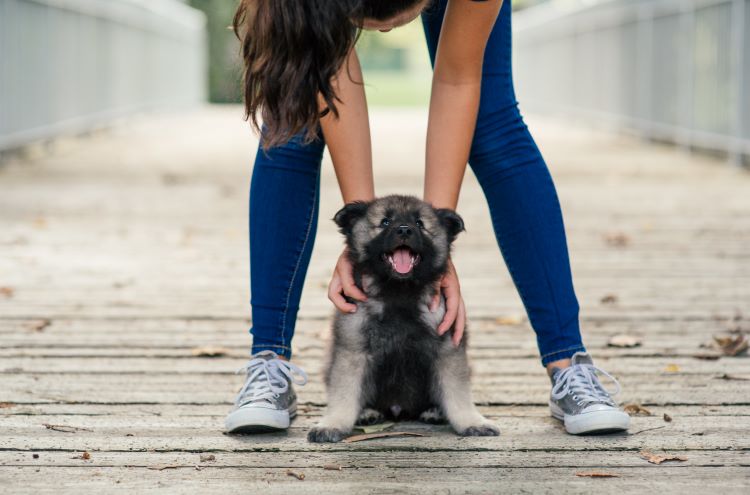Ready to help treat your pet to a healthy life?
8 Tips for First-time Puppy Owners
By : Trupanion Staff | Published Jan 7, 2025

Who can resist the adorable face of a new puppy? The excitement of having a new furry family member also comes with learning how to help them become a lovable, well-behaved adult dog. If you're totally new to puppy ownership, it’s normal to feel a bit overwhelmed by this. After all, you have a lot to do: from getting the right puppy supplies to potty training and socializing your new pet.
You will learn a lot as you go, but soaking up as many new puppy tips as possible can make everything a little easier. Focusing on the most crucial ones will get you off on the right start.
1. Buy the right puppy supplies
Life with a puppy is easier when you have the right supplies on hand. Getting these items before you need them can help you spend more time with your puppy and less time stressing. But if you haven’t done that yet and already have your new pup, no worries! There’s no better time to start than now.
Many items on the list help keep your young dog safe. They also help with proper growth and development. Some items your puppy needs include:
- Water and food bowls
- Puppy food
- A pet gate
- A properly sized dog crate
- A dog carrier for vet visits
- A collar and identification
- A harness and leash
- Puppy pads and other potty training tools
- A dog bed
- Dog toys
2. Create a safe space
Your puppy will be active and curious. Giving him a safe place to explore in your home supports that curiosity while protecting him. Look for a cozy spot without any drafts to set up your puppy's crate and bed. A puppy gate can also keep your new family member in certain areas for safety.
It's also a good idea to puppy-proof your home to remove potential dangers. Many plants are poisonous if dogs ingest them, for example. This includes lilies, aloe, hydrangeas, and hostas. Remove other hazards throughout your home to keep your puppy safe.

3. Start veterinary care early
One of the most important pieces of advice for puppy owners is to find a vet right away. Early veterinary care starts your puppy off on a healthy path. These initial visits help establish your relationship with your vet and can help your pet get used to medical care. They are also a time to ask detailed questions about your puppy’s care and their health.
Vaccinations are also an important part of early vet care. Core vaccines are the ones all puppies should receive. They include distemper, adenovirus, parvovirus, parainfluenza, and rabies. Puppies usually need a series of doses.
Puppies under 16 weeks old usually get three doses of a combined vaccine for distemper, adenovirus, parvovirus, and parainfluenza. They receive a dose every 2 to 4 weeks between the ages of 6 and 16 weeks. Rabies vaccines are also usually administered based on local laws and regulations.
4. Get puppy insurance
While you’re thinking about your new puppy’s help, it’s also important to consider how you’re going to handle unexpected illnesses and accidents. There are no guarantees that these will happen, of course, but the truth is that nearly 1 in 2 puppies need unexpected care before their first birthday (based on internal claims data from Trupanion).
To help handle unexpected veterinary costs, it’s a good idea to get pet insurance or “puppy insurance” while your dog is still young. This is because pre-existing conditions are not covered, so the earlier you protect your puppy, the more you’re likely to get out of their coverage.
5. Dive into training
New puppies are learning all about the world, and this is also the prime time to train your puppy. Early training helps your puppy grow into a well-behaved dog.
Potty training is usually the first priority. Working on going outside to potty can cut down on messes in your house. Crate training is also beneficial, so your puppy gets comfortable with the crate. You might also enroll in a training class to help your dog learn basic commands.
6. Set up a routine
The first few days of having a puppy can be a bit chaotic. But puppies, like other pets, are creatures who thrive on habit. Getting into a daily routine helps everyone adjust. For example, puppies usually need to eat three times per day for the first 6 months. Schedule those feeding times at the same time each day to give them the nourishment they need throughout their first year.
Potty breaks are also important for your young dog. Taking your puppy outside frequently helps him learn when and where to relieve himself. Your puppy also needs lots of playtime and rest built into the schedule.
7. Get to know your new puppy
All puppies might look cuddly and sweet, but know that each has unique personalities and characteristics. Getting to know your puppy better helps you give them what they need. It can also help with your training.
That includes understanding your pup's physical needs. Knowing things, such as the size of your dog when fully grown, can help you plan for the future. Breed types and sizes can affect special needs your dog might have, now and as he grows.
You're also getting to know your puppy's personality and preferences. Tuning in to your puppy's behaviors can help you figure out what he may be thinking and feeling. For example, noticing how he acts before they go to the bathroom can help with potty training. Learning how he behaves when frightened can help you keep your puppy calm.
From basic puppy care tips to potty training advice for puppy owners, you'll get a lot of input from other people when a puppy joins your family.

8. Avoid common mistakes
Being a first-time puppy owner can be overwhelming, and you'll learn a lot through trial and error. You can catch on faster by being aware of these common puppy owner mistakes:
Missing vet appointments
Work with your vet to choose the right checkup schedule. Stick with the appointments, including those for necessary vaccinations, to keep your puppy healthy. Take your new dog to the vet quickly if something seems wrong.
Skipping socialization
You naturally want to soak up all the puppy cuddles you can, but don't keep your puppy home all the time. Socializing your puppy early, especially during the first 3 months, can help develop positive behaviors and reduce unwanted behaviors, such as fear of new situations and aggression.
Sneaking him human food
It's tempting to give in to those pleading eyes when you're snacking on cheese and other yummy human foods. But this can cause problems for your puppy’s health. Always stick to a vet-recommended puppy diet for your pet.
Losing your patience
You're bound to deal with potty training accidents and chewed-up slippers. Puppies sometimes take longer than you expect to learn new things. Staying calm through the not-so-fun parts of puppy ownership helps build trust.
Underestimating the costs
Puppy costs can burn through your money quickly. Adoption fees, basic puppy supplies, and vet visits can all add up. Research all the costs to make sure you're prepared financially. Factoring in the cost of pet insurance can help control costs if you have unexpected vet visits in the future.
Keeping the best new puppy tips in mind while avoiding common puppy owner mistakes can help you settle in faster with your new fluffy friend. Welcome home, puppy!
Check out these fun activities for puppies to help keep your pet active and engaged.
